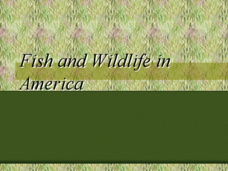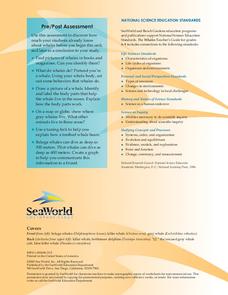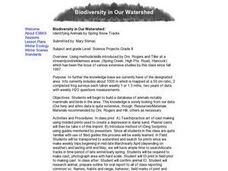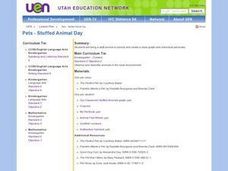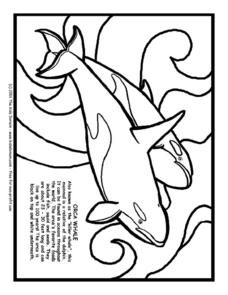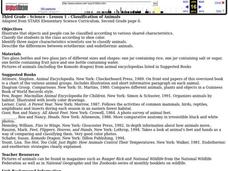Curated OER
Nonfiction Genre Mini-Unit: Persuasive Writing
Should primary graders have their own computers? Should animals be kept in captivity? Young writers learn how to develop and support a claim in this short unit on persuasive writing.
Curated OER
Fish and Wildlife in America
Some of the details of the use of wildlife as food and crop resources are given at the beginning of this slideshow. Next, the historical problems with wildlife are explained, as are some mistakes that have been made leading to extinction...
Science 4 Inquiry
At the Top: A Bald Eagle's Diet
Bald eagles are opportunistic predators and eat fish as well as raccoons and other mammals. Pupils learn about bald eagle diets through a simple simulation and videos. They collect and analyze data to understand the adaptability of this...
Polar Trec
Nature's Density Column
Nature provides density columns in the polar regions that provides food for many animals. Young scientists build their own density columns with water in order to answer analysis questions. Through a slideshow presentation, scholars...
Sea World
Whales
A whale of a lesson is sure to intrigue your elementary oceanographers! Learn about the mammals of the sea with a series of activities about whales, dolphins, and porpoises. Kids complete worksheets about the anatomy of a whale, create a...
Curated OER
Amazing Animal Facts
In this unique animal association worksheet, students match up ten animal facts with ten pictures of various animals shown on the worksheet.
Curated OER
Creating slideshow using Real Slideshow 2.0.
students gather information during field trip to the zoo. They use and present their findings of the types of birds, cats, primates, and other mammals to their teachers and classmates by producing a slide show using Real Slide Show 2.0.
Curated OER
Biodiversity in Our Watershed
Eighth graders create a database of animals and birds in the area in which they live. They use molded prints to make a cast of an imprint from a specific animal. They identify and research animals and prepare an outline for an oral...
Curated OER
Animal Coverings
Students categorize animals by their coverings. They list descriptive words, explore a science center with actual animal coverings, match pictures of animals with coverings, and categorize pictures of animals by their coverings on a...
Curated OER
Quiz
In this quiz worksheet, students, after researching and discussing different types of world-wide animals, determine the answers to ten key true and false questions.
Curated OER
Pets: Stuffed Animal Day
Students bring in their favorite stuffed animals to class, and listen to the book, The Perfect Pet. They develop graphs for their stuffed animals, and create booklets titled, My Pet Book.
Curated OER
Orca United Nations
Students study the differences between sets of data and explain how organisms are adapted to their environment. In this marine mammals lesson students analyze data based on set criteria.
Curated OER
Prairie Ecology Internet Activity
In this prairie ecology worksheet, learners respond to 11 questions that require them to consult selected Internet sources and answer questions about prairie animals and their habitats.
Curated OER
Who Am I?
In this who am I worksheet, students research, state and discuss sixteen pictures associated with different animals found all over the world.
Curated OER
How Many Animals?
Learners use their math skills to develop estimates for the population of several animal species native to the Austrailian rainforest. It is a simulation that researchers at the Center for Rainforest Studies in Australia perform to...
Curated OER
Mammal Morphology - Bats, People, and Other
In this physical characteristics worksheet, students compare bats and humans by putting a + sign in the chart for whether or not bats and humans have the same characteristics. Students do this for 17 characteristics and answer 3 questions.
Curated OER
Orca Whale Information and Coloring Page
In this animal information and coloring page, students read a short factual paragraph about Orca whales before coloring a picture of the mammal in its habitat.
Scholastic
Study Jams! Vertebrates
Your back will be covered when you use this presentation to introduce beginning biologists to phylum chordata, the vertebrates. Five classes are defined: fish, amphibians, reptiles, birds, and mammals throughout the eight vibrant slides....
Curated OER
Animals Galore
Third graders use structural characteristics to sort and classify animals into groups.
Curated OER
Tooth Detectives: Determining the Diets of Extinct Animals
Students study the teeth of living mammals and apply those skills to the interpretation of the diet of extinct animals.
Curated OER
Classification of Animals
Third graders practice classiyfying items and identify three major characteristics scientists use to classify animals. They describe the differences between ectothermic and endothermic animals.
Curated OER
What Animals Eat
First graders organize animals according to what they eat. They compare the teeth of plant eaters and meat eaters.
Curated OER
Oddball Out: Animals
In this problem solving worksheet, pupils analyze a row of pictures of various animals to determine which creature is different from the others pictured.
Curated OER
Animal Classification
In this animals worksheet, students match the words in the first column to the statement that best matches. The terms are associated with the different groups of animals. Students must match 17 terms.
Other popular searches
- Classify Animals and Mammals
- Australian Animals Mammals
- Science Animals Mammals
- Animals Mammals Activities
- Animals Mammals Reproduction



